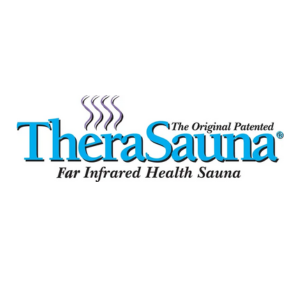IS IT OKAY TO SAUNA WHEN SICK?
There is nothing worse than feeling under the weather. Even if you suffer from pesky seasonal allergies or a mild fever, it can make you feel sluggish and drained. Luckily, a rejuvenating sauna session might be just the ticket to restoring your vitality.
Whether it's the soothing heat or the invigorating steam, saunas possess an almost mystical, therapeutic quality that promises to restore your energy, and if that's not enough, saunas can also help you clear your mind and relax.
What's the science behind this heat therapy, and which type of sauna is the ultimate catalyst for a speedy recovery? Let's take a look!
Different Types of Saunas
Different types of saunas are available on the market, each boasting unique features and benefits.
Here are some of the more common types you'll find:
Traditional Saunas
Traditional saunas have been a staple in many cultures for centuries. They operate on a simple principle: heat a stack of rocks (typically with a wood-fired or electric stove), and voilà, heat floods the room!
People often ladle water over the hot stones to create a burst of steam, increasing the humidity while dialing up the heat to 195 degrees Fahrenheit. This heated environment is perfect for deep detoxification and relaxation.
Steam Saunas
If you want a more steamy experience, consider using a steam sauna. These saunas use steam generators to keep the environment hot and humid. The high humidity can do wonders for your skin and sinuses while providing an immersive experience.
Infrared Saunas
Unlike traditional saunas and steam rooms, infrared saunas use infrared light waves to deliver heat directly to your body. The heat penetrates deeper into your muscle tissues and joints, providing a host of potential benefits — from detoxification and skin rejuvenation to improved cardiovascular health and boosted mood.
These saunas are preferred because of their low-temperature levels of 140 degrees Fahrenheit — which is quite comfortable for many people.

The Benefits of Using Sauna When Sick
The following are some of the major benefits of using a sauna when you're feeling less than your best:
Relieves Congestion
Studies show that airborne irritants like dust, pollen, smoke, and microscopic pathogens can cause congestion and escalate to unpleasant respiratory conditions, such as sinusitis, bronchitis, COPD, asthma, and even lung cancer.
Saunas, particularly steam rooms, can help relieve congestion. Research shows that breathing in moist, warm air reaches deep into your lungs, loosening up stubborn mucus and flushing out other debris lodged in your respiratory system. This makes it easier for you to breathe and reduces your risk of developing lung infections.
Strengthens Immune System
Your immune system is a complex network of cells and proteins that help defend your body from harmful bacteria, germs, and infections.
Johns Hopkins Medicine explains that several factors, such as poor nutrition, smoking, alcoholism, and certain medical conditions like diabetes, HIV, and AIDS, can weaken your immune system and make you more prone to infections.
Consider sauna therapy if you want to stay in tip-top shape and boost your body's natural defense mechanism. When you expose your body to the high temperatures of a sauna, it can lead to a variety of physiological responses.
Research shows that this temporary temperature hike triggers an artificial fever-like state, increasing the production of white blood cells and lymphocytes in the body. This helps your immune system fight against invading pathogens and viruses, which can lead to a faster recovery from illnesses.
Alleviates Seasonal Allergies
For many of us, changing seasons brings pesky side effects like sneezing, runny nose, and itchy eyes. The good news is sauna bathing can be your secret weapon against these annoying symptoms.
Recent studies have demonstrated the effectiveness of steam, a primary component of sauna bathing, in acting as a potent expectorant. The soothing combination of heat and humidity helps in the expulsion of excessive mucus or phlegm from your airways.
Besides helping clear nasal passage, it also reduces irritation and inflammation — two main culprits behind the much-dreaded symptoms of seasonal allergies.
Muscle and Joint Pain Relief
Most of us often associate muscle pain with a strenuous workout or an accidental injury. Contrary to common assumptions, muscle pain isn't confined to the aftermath of physical strains.
Certain medical conditions such as dystonia, fibromyalgia, hypothyroidism, or even the common Influenza can contribute to those relentless muscle aches, notes WebMD. That's where saunas come into action!
Arthritis Foundation explains that the heat of a sauna permeates your muscles, aiding to relax those tightened fibers, alleviating muscle spasms, and significantly reducing pain levels.
Additionally, it delivers oxygen-rich blood and essential nutrients to damaged tissues and cells, speeding up the recovery process.
Reduces Stress
When battling an illness, dealing with aches and pains, or even feeling those telltale muscle twinges, it's natural to stress about what's going on in your body. Luckily, sauna therapy serves as an effective stress reliever.
As you sit in the pleasant warmth of a sauna, your body responds by decreasing cortisol levels and releasing endorphins — the body's natural "feel good" chemical. Cleveland Clinic explains that these neurotransmitters promote happiness, relaxation, and serenity while diminishing pain.
Enhances Sleep Quality
When you're unwell, it can significantly affect your sleep quality. Even with medications, we often wake up at midnight, struggling to fall asleep, but did you know a sauna session could be the solution to your sleep woes?
Research shows that your body's temperature naturally dips as bedtime approaches, signaling it's time to sleep. When you soak up the sauna's heat, you create an intentional and controlled spike in your body temperature.
Once you step out and start cooling down, this process sends a powerful sleep cue to your brain, easing you into a restful slumber.

Potential Risk of Using Sauna When Sick
While sauna sessions offer many health benefits, it's crucial to consider some potential risks, particularly when you're feeling under the weather.
Here is a comprehensive list so you stay informed:
-
Pregnancy: Some studies suggest excessive heat exposure, like in a sauna, may increase the risk of congenital disabilities or complications. Pregnant individuals should consult their healthcare provider before engaging in sauna sessions.
-
Heart concerns: Individuals with cardiovascular issues should be cautious, as saunas can elevate heart rates and blood pressure. To ensure safety, it's wise to check with your doctor before starting sauna therapy. The same goes for diabetic and hypertensive patients.
-
Germ transfer: Stepping into a sauna with other people can potentially increase germ exposure, heightening your infection vulnerability. Opt for a solo session or a thoroughly sanitized environment when feeling unwell.
-
Dehydration: Dehydration can be severe when sweating profusely in a sauna. When you have a fever or sore throat, this fluid imbalance might worsen your condition. Ensure to drink ample water before, during, and after your session to prevent any adverse effects.
-
Overheating: Feverish conditions and sauna heat might result in excessive body temperatures. If your illness is accompanied by fever, avoid sauna sessions until your fever subsides.
-
Respiratory infections: In respiratory infections, excessive heat and humidity might exacerbate coughing and breathing difficulties. Consult your healthcare provider on whether sauna therapy is appropriate for your condition.
Safety Tips for Using Sauna When Sick
Using a sauna when you are sick can have benefits and risks. Here are some tips for using sauna safely and effectively when you are sick:
-
Drink plenty of water before and after your sauna session to prevent dehydration. You can lose a lot of fluids through sweating, so it is essential to replenish them.
-
Avoid alcohol and medications that may impair sweating and produce overheating.
-
Stay in the sauna for no more than 15 to 20 minutes at a time. More prolonged exposure can be harmful and cause overheating, dizziness, or fainting. If you feel unwell during your sauna session, head for the door immediately.
-
Cool down gradually after your sauna session. Don't take a cold shower or jump into a pool immediately; this can shock your system and cause blood pressure changes. Instead, sit or lie in a cool place and relax for a few minutes.
Best Saunas to Use When Sick
Almost Heaven Watoga 4-Person Standard Barrel Sauna
The Almost Heaven Watoga 4-Person Standard Barrel Sauna is your ticket to ultimate comfort and relaxation. This sauna comes with a Harvia 4.5kW electric heater capable of heating your sauna to a toasty 195 degrees Fahrenheit.
You can further delay the start-up time by eight hours. This sauna is assembled using a 1-3/8" thick ball and socket lumber. Not only does this ensure a robust and long-lasting build, but it also enhances the sauna's insulating capabilities.
This sauna has LED lights that fill the room with a serene glow. It features opposite-facing benches that offer ample space to stretch out or engage in conversation.
It is also available in rustic cedar and white fir, so you can customize your sauna to fit your unique aesthetic. With this sauna, you can add color-changing mood lights, a flat floor kit, and a Himalayan salt panel for an invigorating sauna session.


Health Mate Elevated Health Infrared Sauna
The Health Mate Elevated Health Infrared Sauna takes wellness to a new level. This sauna is created using fast-growing, anti-microbial eucalyptus wood, which is odorless, moisture-resistant, and easy to clean, making your sauna a breeze to maintain.
The patented Tecoloy™ heater delivers a remarkable 360 degrees of dual wave heat, penetrating up to 40% deeper into your tissues. The sauna comes with a 96-diode near-infrared LED chromotherapy light panel that provides potential harmonizing effects on your mind and body.
Additionally, the handy magazine holder keeps your reading materials within arm's reach, while the Bluetooth CD player makes it easy to play soothing tunes, uplifting beats, or guided meditation.
This sauna boasts patented interior and exterior controllers that make it easy to manage your sauna's temperature, lighting, and other settings.
FAQs
Is it okay to use a sauna when you have a cold?
Yes. Saunas can help open and clear your nasal passages, temporarily relieving congestion. The heat can also help relax stiff and achy muscles, alleviating some of the discomfort that comes with a cold.
It's important not to go to the sauna alone and listen to your body. If you're feeling especially weak, lightheaded, or feverish, it's best to skip the sauna session until you feel better.
Is a dry sauna good for chest congestion?
Yes, a dry sauna can be beneficial in relieving chest congestion. The intense heat can cause your body temperature to rise and promote blood vessel dilation, increasing blood flow to the lungs. It encourages deep breathing, which can help loosen and drain mucus from the lungs.
How long should you sit in a sauna when sick?
When you're feeling under the weather, striking the right balance is essential. Generally, spending 15 to 20 minutes in a sauna when you're sick should be enough to reap some benefits without overtaxing your body.
Can you sweat out a virus?
No, the concept of sweating out a virus in a sauna is actually a common myth. While saunas can boost the immune system and possibly help the body fight off viruses more efficiently, they cannot directly expel a virus from your body.
If you're under the weather, try sauna bathing along with your medication to feel better faster.
Is a sauna good for sore throat?
Absolutely! The heat and steam can help soothe irritated mucous membranes, helping alleviate some discomfort associated with a sore throat.
Is a steam room better than a sauna?
The answer to whether a steam room is better than a sauna largely depends on individual preferences and wellness goals. Saunas use dry heat and can reach temperatures up to 195 degrees Fahrenheit, potentially improving circulation, easing muscle pain, and relieving stress.
On the other hand, steam rooms typically do not exceed 120 degrees Fahrenheit. However, the high humidity in steam rooms can hydrate and rejuvenate skin, alleviate sinus congestion, and help with certain respiratory issues. It's all about knowing what your body needs and finding the best fit for you!

Using Sauna When Sick: The Takeaway
Sauna therapy offers many health benefits, from enhancing circulation and promoting detoxification to boosting immune function, and it’s the perfect solution when you are feeling under the weather.
Even if you're battling a cold or feeling a little off, you can take advantage of the sauna heat to get through it. Remember to hydrate sufficiently, listen to your body, and take it easy — don't push yourself if you're feeling too sick.
If you want to install a private sauna at home, consider checking out My Sauna World's traditional and infrared sauna collection. For more information, call us, and we'll be happy to guide you through the process.
SIGN UP. SAVE BIG.
Subscribe to be the first to know about our special monthly sauna sales, sent right to your inbox.

About the Author
Adam Fromson
Adam Fromson, co-founder of My Sauna World, loves saunas and their transformative health benefits. With years of experience exploring sauna culture and its impact on health and wellness, Adam is passionate about helping others discover the life-changing benefits of saunas for themselves.
Let customers speak for us
from 387 reviews
Good communication, easy delivery, easy set up, easy operation, great value. Recommended!
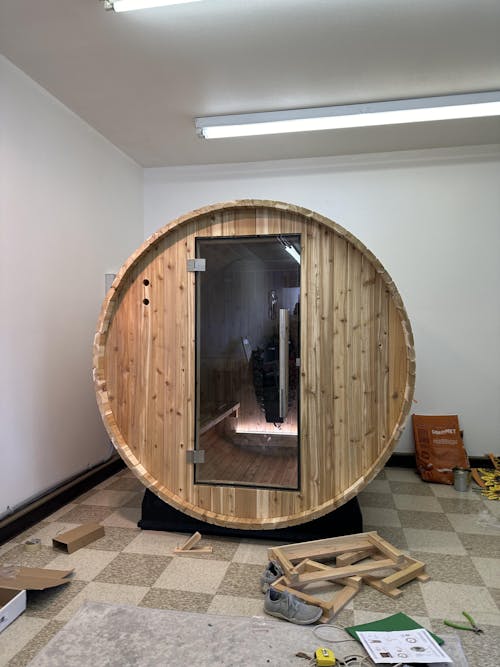
We ordered the 4 person barrel sauna and love it! We wanted a little extra space for the 2 of us/guests and it’s great. We could definitely fit 4 people in it if we needed. We use it every single day. It took about 10 weeks to get here because they build it specifically for the order. Putting the barrel together was fairly easy with 2 people. The electrical and the heater definitely required an electrician to install as we could have not done it alone.
We ordered the biggest heater (harvia spirit 8kw) and it heats up the sauna in about 15 mins inside our 40-50° garage. Overall this style of sauna is hotter and you sweat a lot faster than in an infrared sauna. I truly 10/10 recommend!
Pic is of us in the middle of building it.
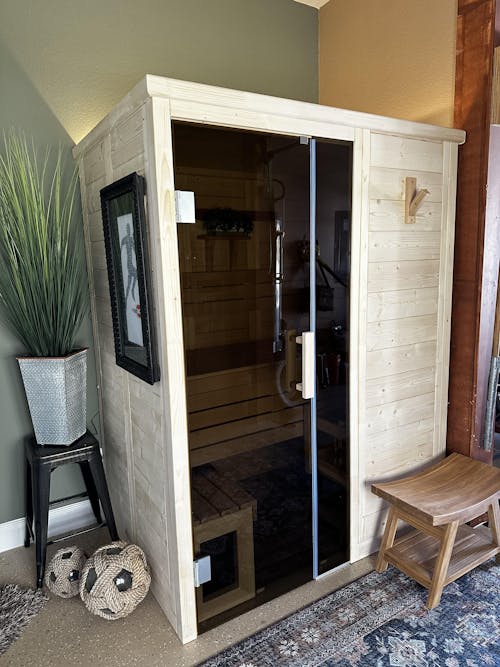
Took me about 6 hours over 2 evenings to assemble almost all by myself. Had a pro run a new circuit from my panel. Very well made and assembly was straightforward. Heater is well sized and reaches operating temperature in under 30 minutes.
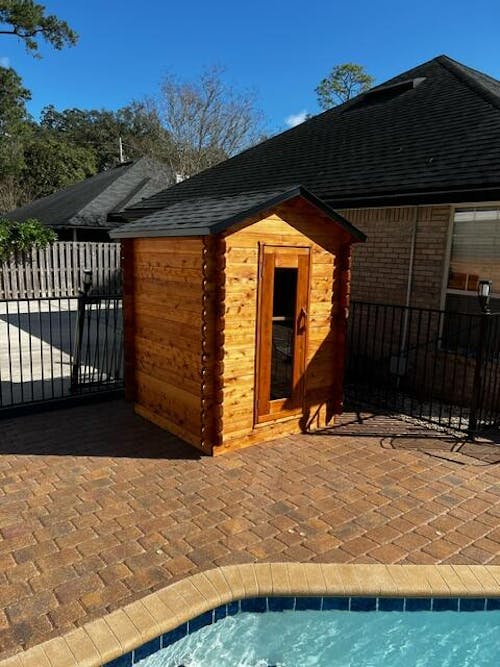
Great sauna very easy to assemble

The salt panel was a great addition to our Madison Sauna. It has excellent grain which is accented by the amazing color lights that glow through the panel. Also when you hit the rocks with a splash of water you can feel the heat bounce off the panel. Great addition if you are considering this option.
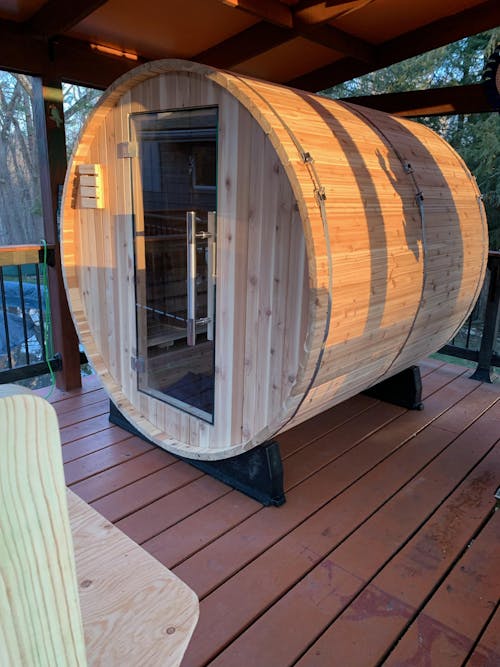
We can say enough about Sauna World there customer support is great! Our Pinnacle Sauna from Almost Heaven is epic.
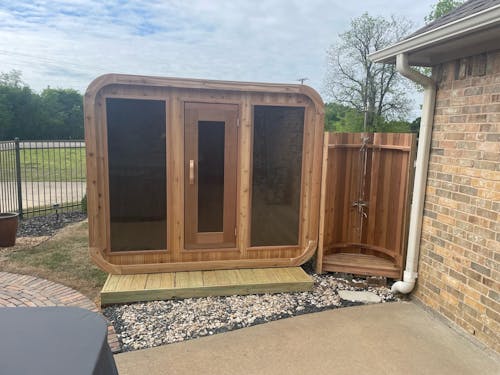
The finish and quality is outstanding and it was quick and easy to assemble.

We are thrilled with our mini pod!! It came well shipped and our friend assembled it in 11 hours! Wow! We cannot wait to get healthy and sauna it up!

Beautiful sauna!!! Much easier than I expected to assemble, took a total of 4 hours. Can't wait to get warm by the pool on those cool evenings. Customer service was excellent..

Purchased a 2 person Almost Heaven barrel sauna and were delighted with the product. The order process was quick and easy, the sauna arrived on-time, installation was simple, following the provided instructions, and the sauna is extremely high quality. We’ve used it daily for over 2 weeks and quite frankly I don’t know how we lived without it. If I had it to do over again I wouldn’t change a thing... except maybe purchasing a 4 person model to easier share with friends!

Great Customer Service and a breeze to put together.Excellent shipping and the Sauna is top notch, couldn’t be happier




























